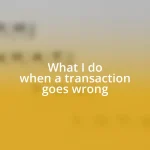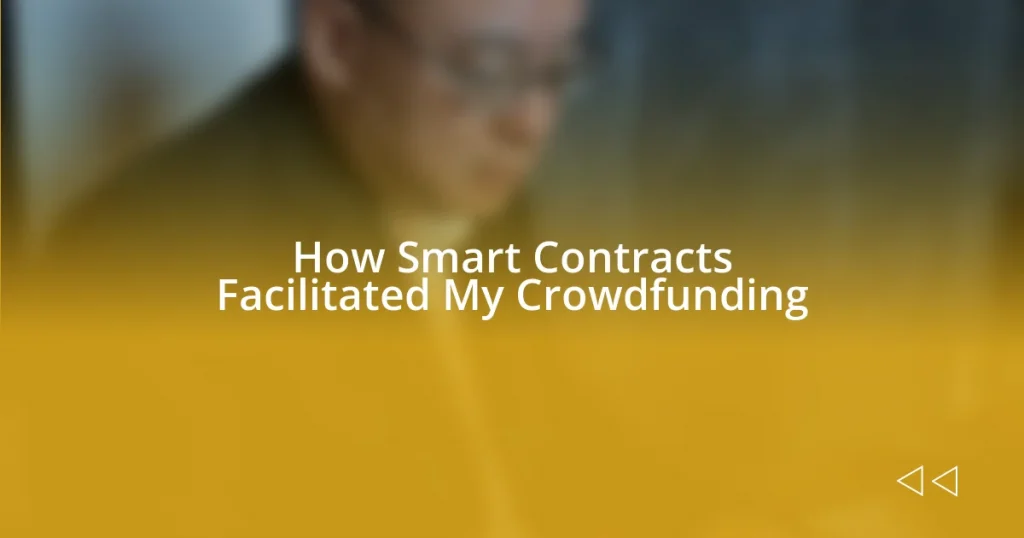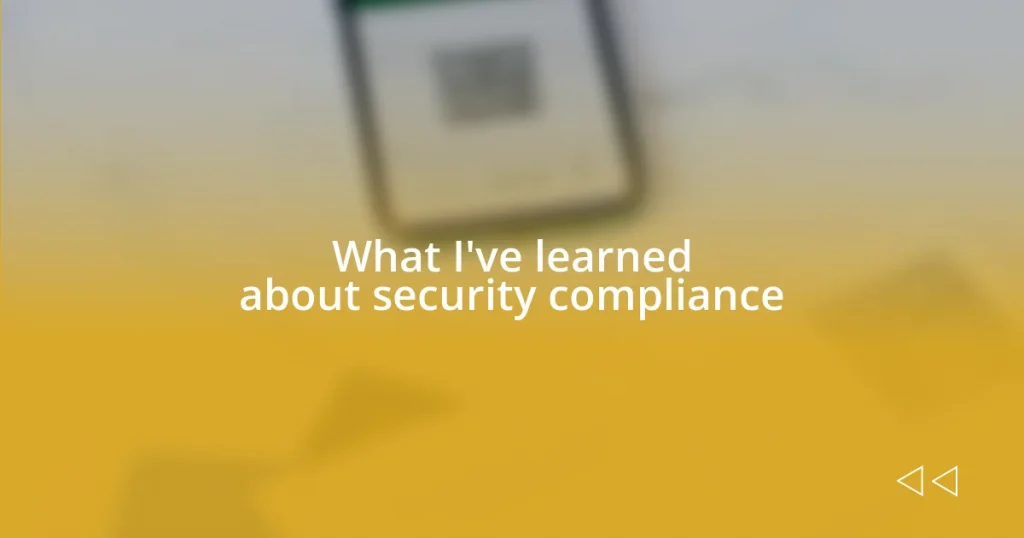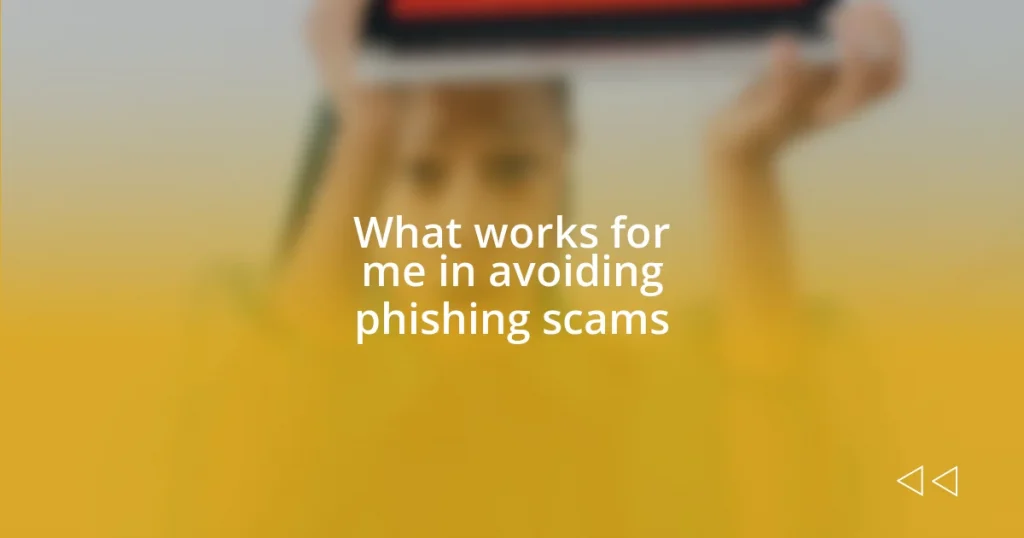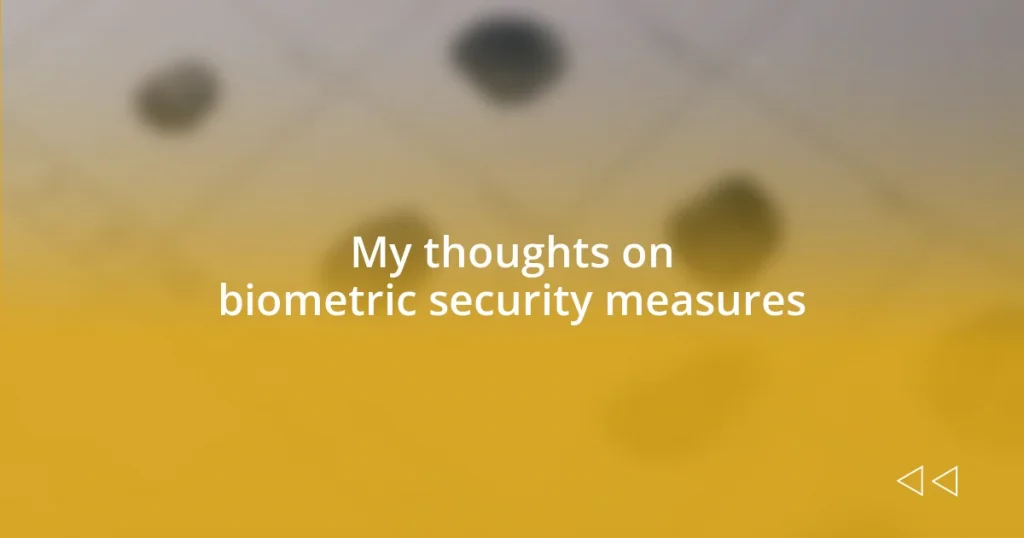Key takeaways:
- Smart contracts automate agreements, enhancing trust and transparency in crowdfunding by eliminating the need for intermediaries.
- Choosing the right platform is crucial, with factors like security, transaction speed, and user experience significantly impacting crowdfunding success.
- The future of smart contracts could see advancements like real-time adaptability and interoperability across blockchain platforms, improving efficiency and compliance.
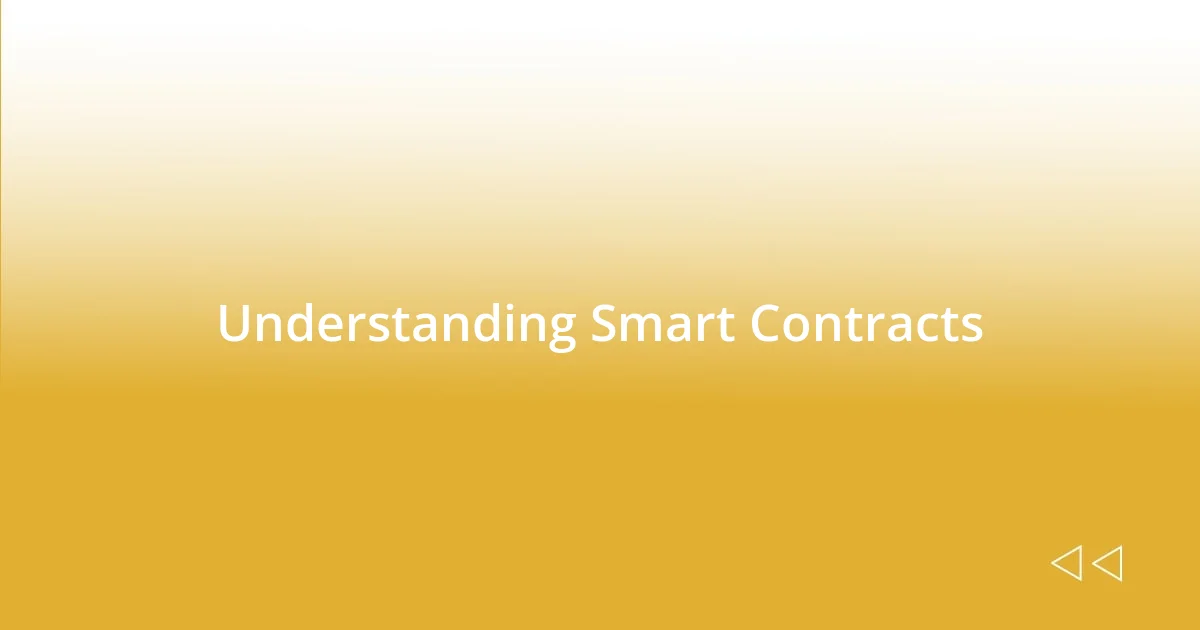
Understanding Smart Contracts
Smart contracts are self-executing agreements with predefined rules and outputs encoded into them. When I first started exploring this technology, I was fascinated by the idea that a contract could operate without the need for intermediaries, which eliminated a lot of the friction I’d often seen in traditional agreements. Have you ever found yourself waiting endlessly for a response from a third party? With smart contracts, that anxiety fades away—they automate the process.
What truly struck me was the way these contracts execute automatically when conditions are met. I remember launching my first crowdfunding campaign; knowing there would be no manual oversight gave me an incredible sense of security. It was like having a trustworthy partner watching over every transaction, ensuring everything went smoothly and transparently.
Understanding smart contracts also opened my eyes to their potential for trust-building in relationships. Picture this: instead of worrying about whether funds were handled correctly, I could focus on crafting my vision. Isn’t it reassuring to think that technology can foster such transparency? This peace of mind has been invaluable in navigating the complex realm of crowdfunding.
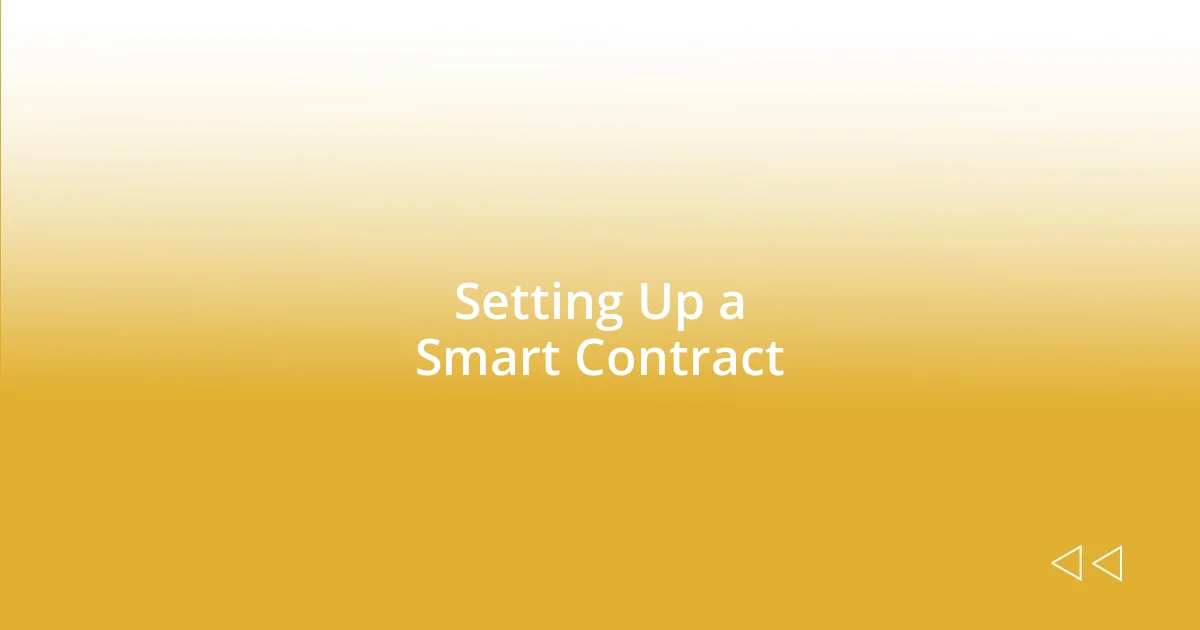
Setting Up a Smart Contract
Setting up a smart contract can feel overwhelming at first, but I found it surprisingly user-friendly. I remember sitting down with a clear idea of what I wanted my crowdfunding campaign to achieve. With the specific conditions in mind—like the amount I needed and the timeline for reaching it—I was able to map out the rules that would govern my smart contract. It was almost like drafting a business plan, but with far less red tape.
One of the most crucial aspects was choosing the right platform. Each option I found had its unique features and fees. I paid close attention to how they handled security and transaction speed. In my experience, these factors can significantly impact the success of a crowdfunding effort. Learning about Ethereum, for example, gave me confidence; it was like stepping onto a bustling marketplace built on trust and efficiency.
When I finally wrote my first line of code, I felt a rush of excitement. I remember thinking, “This is my project, fully automated!” Seeing my ideas transform into a tangible smart contract felt empowering. It allowed me to communicate my vision without intermediary delays, which is incredibly liberating when you’re eager to bring a project to life.
| Platform | Key Features |
|---|---|
| Ethereum | Widely used, strong developer community, well-documented resources |
| Binance Smart Chain | Lower fees, faster transactions, great for smaller campaigns |
| Solidity | Popular programming language, easy to learn for creating smart contracts |
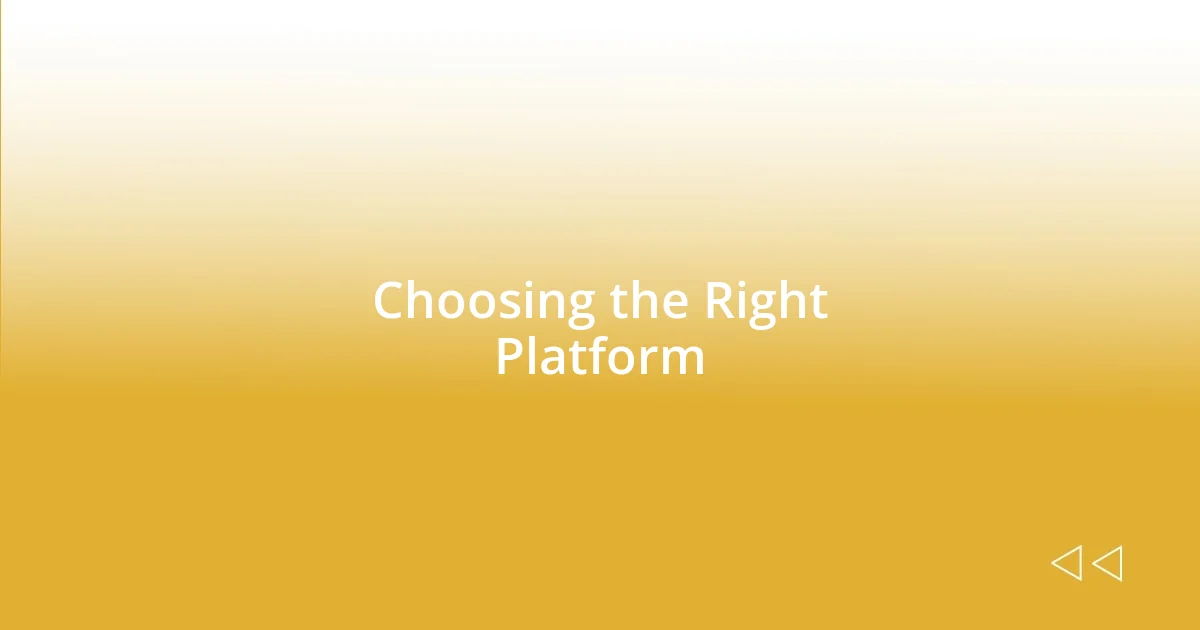
Choosing the Right Platform
Choosing the right platform for my crowdfunding venture was a pivotal decision. After browsing several options, I quickly realized each platform offered a distinct experience. It felt a bit like shopping for the right house; every place had its pros and cons, and I needed to find one that felt just right. I remember going through user reviews for each platform, desperate for insights that would guide my choice. Those little nuggets of information made all the difference; they often highlighted how users felt during their crowdfunding journeys.
Here are some key considerations that influenced my choice:
- Security Features: I prioritized platforms known for robust security measures. Knowing my funds were safe relieved much of my anxiety, especially considering the financial stakes.
- Transaction Speed: A quick transaction process was non-negotiable for me. I didn’t want my campaign held up by slow confirmations.
- Community Support: Platforms with strong developer communities offered reassurance. I knew I could find help if I encountered hurdles.
- Fee Structure: Transparency in fees was crucial. Hidden costs could derail a campaign, and I wanted no surprises.
- User Experience: A user-friendly interface was essential. The easier it was to navigate the platform, the more focus I could put on my project.
Ultimately, it was a blend of these factors that led me to select the ideal platform for my needs. Each attribute felt like a building block in constructing my crowdfunding success, and I was eager to get started.
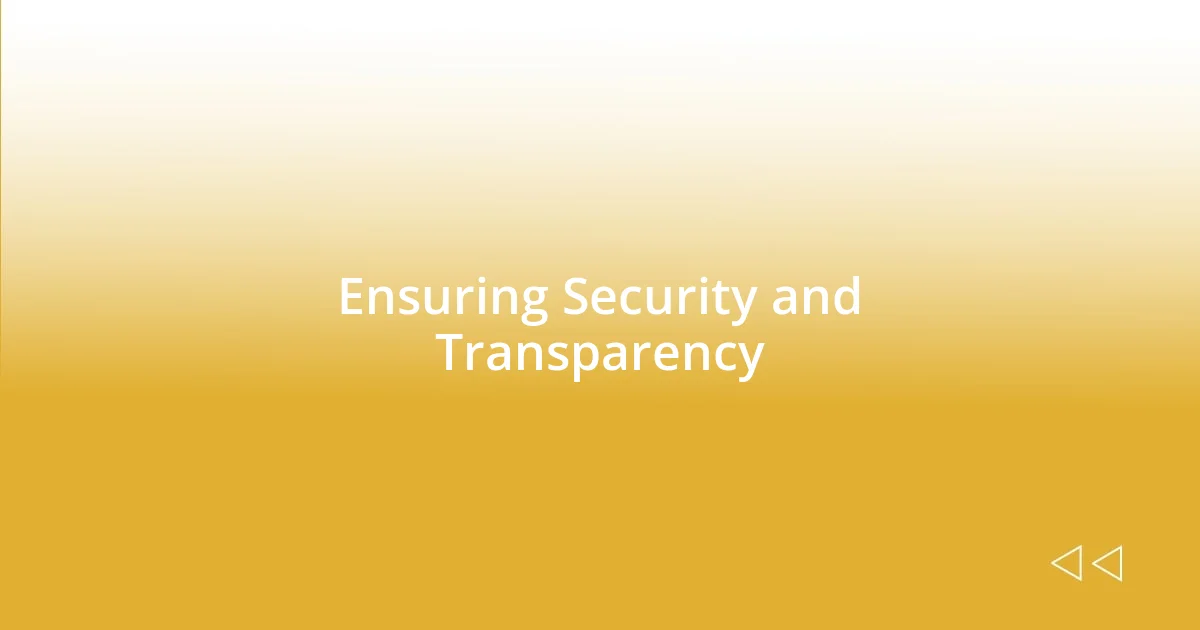
Ensuring Security and Transparency
Ensuring the security and transparency of my crowdfunding campaign was paramount. I distinctly recall the unease I felt knowing that people would entrust me with their hard-earned money. That anxiety pushed me to thoroughly study the security protocols every platform had in place. In the end, I chose a system that utilized public ledgers; it felt like shining a spotlight on my project’s financial transactions, ensuring that every contributor could verify where their funds were going.
Transparency didn’t just ease my concerns; it also built trust with my backers. I found that being able to show them real-time data about how much was raised and how the funds were being distributed fostered a sense of inclusivity. I once received a question from a backer asking how their contribution made a difference. Being able to share a direct link to my smart contract, showing them the exact allocation of resources, felt incredibly satisfying. It was less about just raising money and more about creating a community where everyone felt invested.
I learned that in the digital landscape, trust is absolutely precious. The notion of a smart contract, operating on immutable code, felt like a protective shield around my campaign. The idea that the rules were set in stone—unaffected by whims or errors—was both reassuring and empowering. How could I not feel invigorated knowing that my crowdfunding journey was anchored in such a solid framework?

Real World Case Studies
The turn to smart contracts became a game changer for projects like mine—just look at the case of a tech startup in my city that successfully raised $500,000 through a token sale. They managed to execute their entire process through a smart contract on the Ethereum blockchain. When I heard their story, I realized the efficiency was staggering; once the funding threshold was reached, the tokens and funds were automatically distributed without anyone lifting a finger. Can you imagine the weight lifted off their shoulders, knowing that everything was secured and handled by code?
Another inspiring example was a sustainable energy initiative that used smart contracts to engage backers. They allowed contributors to see not just the funds raised but also the project’s ongoing energy production in real-time. This transparency genuinely intrigued me; I wondered how many other projects could utilize such technology to connect backers more closely to the impact of their contributions. It’s fascinating to consider how that level of engagement could shape future crowdfunding efforts.
In my research, I also learned about a charitable cause that used smart contracts to guarantee fund allocation for specific missions. After the campaign ended, they reported back to the contributors with a breakdown of how every dollar was spent. Hearing how their smart contract framework helped hold them accountable left a lasting impression on me. It sparked a thought: Isn’t accountability the best advertisement for future funding? When backers see their money making a real difference, isn’t that experience worth sharing?
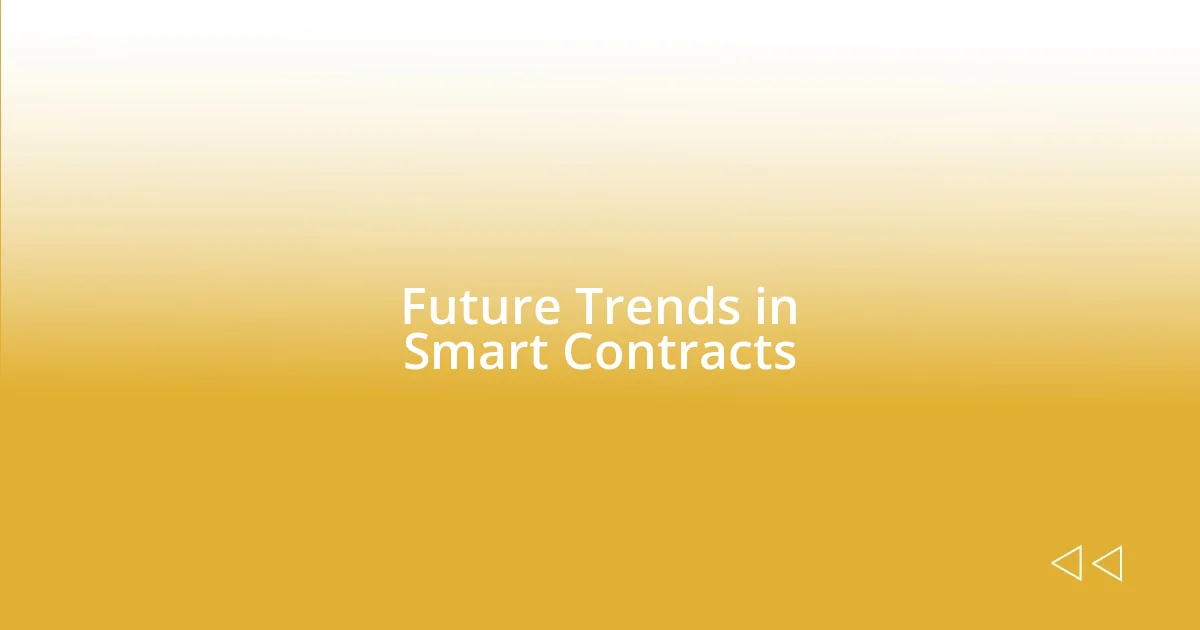
Future Trends in Smart Contracts
The future of smart contracts is undoubtedly exciting. As I look ahead, I can’t help but think about how advancements in artificial intelligence may enhance these contracts. Imagine a world where smart contracts automatically adapt to changing conditions based on real-time data. That could lead to even more seamless crowdfunding campaigns, where the parameters can shift dynamically to ensure projects meet funding goals efficiently. Wouldn’t that change the game for creators and backers alike?
I recently stumbled upon discussions about interoperability, and I find it fascinating. As different blockchain platforms begin to communicate with one another, we could see smart contracts working across various ecosystems. This could empower crowdfunding projects to tap into larger audiences, regardless of which blockchain they’re initially built on. It makes me ponder how far we can push innovation when our systems aren’t confined by boundaries.
Then there’s the notion of regulatory integration. As governments begin to acknowledge the benefits of blockchain technology, I envision smart contracts becoming a standard element in compliance processes. This could simplify things for creators like myself, ensuring that our projects automatically meet regulatory requirements. Isn’t it thrilling to think that a technology designed for freedom could also streamline our path to legality and trust? The potential here is huge, and I can’t wait to see how it all unfolds.





